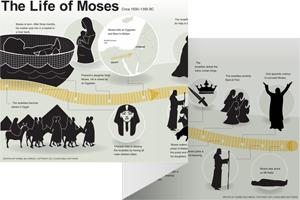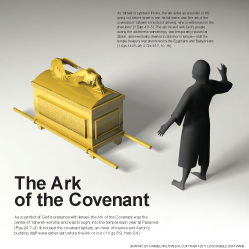10:1–11 Deuteronomy 10 continues the recollection that Moses had begun in ch. 9, where he recalled receiving Yahweh’s laws on tablets of stone and then smashing them at the golden calf incident (see Exod 24:12; 31:18; 32:15–16; compare Deut 4:13; 5:9). The gesture showed that the people broke the covenant with Yahweh as soon as it had been given. By replacing the tablets, Yahweh agreed to restore the covenant. As described in Exodus, Yahweh reestablished the covenant after the broken tablet incident, but said He would not continue with Israel (see Exod 32:14, 34; 33:1–5). Moses, unsatisfied with Yahweh’s decision, begged Yahweh to restore His personal relationship with Israel (Exod 33:14–17; 34:1–4, 9–28). Deuteronomy 10 recalls Yahweh’s decision to once again give His Ten Commandments to Israel. |
10:1 Carve for yourself two tablets of See Exod 24:12; 31:18; 32:15–16; compare Deut 4:13; 5:19. Although Yahweh inscribes new tablets, He does not make them as in the original instance (Exod 32:16). This suggests a less intimate relationship with Israel. The account in Exodus makes this more explicit by recording God’s initial refusal to accompany Israel after the incident at Sinai (see Exod 32:14, 34; 33:1–5).
the mountain Referring to Horeb or Mount Sinai; see note on Deut 1:6.
you shall make for yourself an ark of wood This may not refer to the ark of the covenant. The Hebrew word for “ark” (aron) simply denotes a box or chest.
10:4 the ten words See Exod 34:28 (compare Exod 20).
from the midst of the fire See Exod 19:16–20; 24:15–18; 33:11.
10:6 there Aaron died and was buried Elsewhere in the narrative about Israel’s journey to Canaan (Num 33:37–39), Aaron’s death occurs 40 years after the golden-calf incident. Its mention here prior to entering Canaan may indicate that not seeing the land was a punishment for his role in the golden calf incident.
10:8 carry the ark of the covenant of See Num 4:4–15; 10:21. On the ark of the covenant, see Exod 25:10 and note.
10:9 there was not for Levi an allotment or an inheritance The Levites’ portion and inheritance comes through the tithes and offerings given to Yahweh from the Israelites (Num 18:20–24). Compare Deut 12:12; 14:27; 18:1, 2; Josh 13:33; 14:3; 18:7; Ezek 44:28.
10:11 I swore to their ancestors to give to them God relented from his intention to destroy Israel (Deut 9:19) and renewed the Sinai covenant (Num 10:1–5). The people of Israel would enter the land only because of God’s mercy, not because of any merit of their own. This leads Moses to reemphasize the absolute necessity of obedience.
10:12–22 Yahweh mercifully renewed the covenant and allowed the Israelites to enter into the land rather than destroying them. In light of this, Moses urges the Israelites to obey Yahweh and to adopt a right attitude of the heart rather than blindly obeying Yahweh’s commands. To make this point, Moses uses the image of circumcising the heart (see Deut 10:16; compare Lev 26:41; Jer 9:25; Ezek 44:7). Circumcision was a sign of Yahweh’s covenant with His people (Gen 17); He desired for their actions and thoughts to reflect the same kind of obedience. |
10:13 the commandments of Yahweh and his statutes Serving Yahweh (Deut 10:12) is inseparable from obeying His commandments.
for your own good Yahweh’s commandments and statutes were not aimed at restricting Israel’s prosperity and joy in the land, but at magnifying it.
10:15 was very attached, so as to love See 7:7–8.
he chose their offspring See Gen 12:1–3; 15:1–6, 18; 28:13; 35:12; 48:21; compare Deut 32:8–9.
10:17 God, he is God of the gods and Lord of the lords Israel’s attitude should stem from recognizing that Yahweh elected them out of love (v. 15) and that He is superior over all other gods. The backdrop for this contrast is God’s decision at Babel (see 32:8–9), where He disinherited the nations of the earth and chose Israel alone as His “portion” for inheritance.
the great and mighty God, the awesome one God has shown His elective love for Israel in delivering the Israelites from Egypt and performing other wonders (Exod 12–14; Deut 4:34; 6:22; 7:19).
10:18 justice for the orphan and widow See Exod 22:22; Pss 68:5; 146:9.
10:20 by his name you shall swear Swearing by Yahweh’s name served as an expression of loyalty. See note on Deut 6:13. See 6:13; Josh 2:12; Psa 63:11; Isa 45:23; 65:16; Jer 12:16.
10:21 these great and awesome things A reference to the exodus, which also serves as a promise to act on Israel’s behalf in the future. See Exod 12–14; Deut 4:34; 6:22; 7:19.
10:22 as the stars of the heaven with respect to multitude The size of the current population is illustrative of Yahweh’s faithfulness to His promise. See Gen 15:5 and note; compare Gen 22:17; Exod 32:13.

|
About Faithlife Study BibleFaithlife Study Bible (FSB) is your guide to the ancient world of the Old and New Testaments, with study notes and articles that draw from a wide range of academic research. FSB helps you learn how to think about interpretation methods and issues so that you can gain a deeper understanding of the text. |
| Copyright |
Copyright 2012 Logos Bible Software. |
| Support Info | fsb |
 Loading…
Loading…



